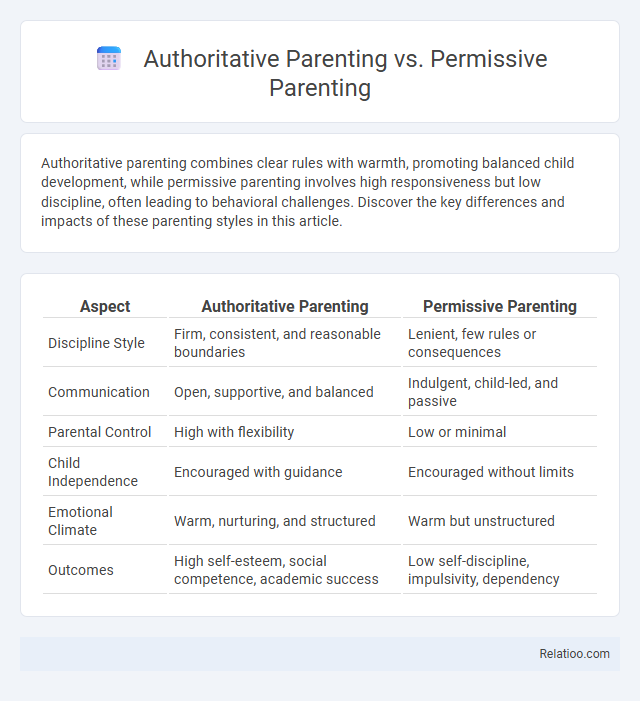Authoritative parenting combines clear rules with warmth, promoting balanced child development, while permissive parenting involves high responsiveness but low discipline, often leading to behavioral challenges. Discover the key differences and impacts of these parenting styles in this article.
Table of Comparison
| Aspect | Authoritative Parenting | Permissive Parenting |
|---|---|---|
| Discipline Style | Firm, consistent, and reasonable boundaries | Lenient, few rules or consequences |
| Communication | Open, supportive, and balanced | Indulgent, child-led, and passive |
| Parental Control | High with flexibility | Low or minimal |
| Child Independence | Encouraged with guidance | Encouraged without limits |
| Emotional Climate | Warm, nurturing, and structured | Warm but unstructured |
| Outcomes | High self-esteem, social competence, academic success | Low self-discipline, impulsivity, dependency |
Understanding Parenting Styles: Authoritative vs Permissive
Authoritative parenting balances clear rules with warmth, fostering independence and social competence in children, while permissive parenting offers high warmth but lacks consistent boundaries, often leading to behavioral challenges. Understanding your approach to these parenting styles can help optimize child development by promoting responsibility and emotional regulation. Modeling behavior remains crucial as children learn by observing, reinforcing the effects of either authoritative or permissive practices in shaping their actions and attitudes.
Key Characteristics of Authoritative Parenting
Authoritative parenting is characterized by high responsiveness and high demands, fostering a balanced approach where parents set clear rules while being supportive and communicative. This parenting style promotes children's independence, self-regulation, and social competence through consistent discipline combined with emotional warmth. Research links authoritative parenting to positive outcomes such as higher academic performance, better mental health, and greater self-esteem compared to permissive parenting, which is marked by low demands and high responsiveness, or modeling, which emphasizes behavior observation without explicit guidance.
Defining Traits of Permissive Parenting
Permissive parenting is characterized by high responsiveness and low demands, where parents exhibit warmth and acceptance but set few rules or boundaries. This style often leads to children lacking self-discipline and experiencing difficulties with authority due to inconsistent enforcement of limits. Understanding your approach helps you balance nurturing with structure to promote healthy development.
Communication Styles in Each Parenting Approach
Authoritative parenting emphasizes open, two-way communication with clear expectations and empathetic listening, fostering mutual respect and understanding. Permissive parenting features lenient communication, often lacking structure and consistent boundaries, which can lead to misunderstandings and limited guidance. Modeling parenting relies heavily on nonverbal cues and behavior imitation, where parents demonstrate desired communication styles through actions rather than explicit instructions.
Discipline Methods: Structure vs Leniency
Authoritative parenting emphasizes consistent discipline methods that balance firm structure with responsive support, fostering self-regulation and social competence. Permissive parenting often exhibits leniency, resulting in lack of clear boundaries and potential behavioral issues due to minimal enforcement of rules. Modeling discipline, where parents demonstrate appropriate behaviors, integrates structured expectations with natural consequences, promoting internalized values without excessive rigidity.
Emotional Impact on Children
Authoritative parenting fosters emotional resilience in children by combining warmth with clear boundaries, promoting self-regulation and confidence. In contrast, permissive parenting often leads to emotional insecurity and difficulties in self-discipline due to a lack of consistent limits. Modeling behavior significantly shapes children's emotional development as they imitate parental emotional responses and coping strategies, influencing their ability to manage stress and build healthy relationships.
Effects on Children’s Academic Performance
Authoritative parenting, characterized by high responsiveness and clear expectations, is linked to improved academic performance due to children's enhanced self-discipline and motivation. Permissive parenting, marked by low demands and high warmth, often results in lower academic achievement as children may struggle with self-regulation and task persistence. Modeling, where parents demonstrate positive behaviors and attitudes towards learning, reinforces academic success by fostering intrinsic motivation and effective study habits in children.
Social Development Outcomes
Authoritative parenting fosters strong social skills and emotional regulation by setting clear expectations while offering warmth, promoting your child's ability to form healthy relationships. Permissive parenting often leads to challenges in social development due to a lack of boundaries and inconsistent discipline, resulting in difficulties with self-control and peer interactions. Modeling effective social behavior through consistent actions teaches children essential interpersonal skills, contributing positively to their social competence and overall development.
Long-Term Consequences for Child Behavior
Authoritative parenting fosters independence and strong social skills, leading to positive long-term child behavior such as self-regulation and resilience. Permissive parenting often results in children exhibiting impulsivity and poor self-discipline, increasing the risk of behavioral problems later in life. Modeling effective behaviors, where parents demonstrate consistent and respectful actions, reinforces emotional intelligence and social competence that benefit Your child's development over time.
Choosing the Right Approach for Your Family
Choosing the right parenting approach depends on balancing structure and flexibility to foster your child's development effectively. Authoritative parenting provides clear boundaries with warmth, encouraging independence and self-discipline, while permissive parenting offers high responsiveness but less guidance, which may lead to challenges in self-control. Modeling positive behavior remains essential across all styles, shaping your child's values through consistent actions rather than words.

Infographic: Authoritative Parenting vs Permissive Parenting
 relatioo.com
relatioo.com